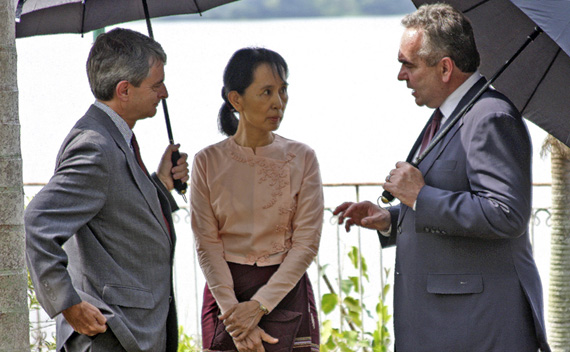Where Now for Burma Policy?
More on:
Lost amidst the ongoing tension in neighboring Thailand and the Obama administration’s attempts to build a closer partnership with Indonesia, Washington’s Burma policy appears to have reached a standstill – or a turning point. After more than a decade of sanctions on the ruling junta, the Obama administration decided to try engaging Nyipyidaw. Thus far, Assistant Secretary of State Kurt Campbell has made two trips to Burma over the past year, in an attempt to get the two sides talking and to find out more information about critical issues like the upcoming national elections in Burma and allegations that the junta is pursuinga nuclear weapons program with the assistance of North Korea.
But engagement does not seem to be producing any more results than sanctions did, despite Campbell’s thought-out and good faith efforts. Though I am not privy to classified information, there appears to be no signs that the Burmese regime is backing off of its growing military to military ties with North Korea, or that it is making an effort to reassure its neighbors that it is not building a nuclear program, which would put it in violation of the Association of Southeast Asian Nations’ nuclear weapons free zone. The junta also sent relatively low-ranking officials to meet with Assistant Secretary Campbell during his visit in May, a sign the regime is not taking the dialogue seriously.
Yet the failure of engagement thus far cannot mean a return to largely ignoring Burma. Though the military has taken nearly every step possible to predetermine the results of the upcoming election, the first vote in the country in two decades, there is still some chance that, on voting day, the military will allow a free and fair count, since the regime says it will allow all political parties to observe the counting process. Indeed, despite the fixing of many elements of the poll, some Burmese do see it as the best opportunity for any change in twenty years. Perhaps more important, the ethnic minority regions of Burma, principally in the north and the east of the country, face serious crisis, since the junta wants to essentially disarm the ethnic minority militias roaming many of these areas, in order to make them part of a regime-controlled border guard force. There is a real possibility of an outbreak of armed conflict in these regions, which would spark massive refugee flows, and, most likely, higher rates of HIV/AIDS and narcotrafficking. Renewed conflict could in fact destabilize the whole region, including parts of China, India, and Thailand – reason enough for Washington to be worried.
In the near term, a pragmatic U.S. policy will mean simply keeping the focus on Burma, so that the junta recognizes that the world is paying attention to the upcoming election, as well as the junta’s growing links with North Korea. A pragmatic policy also will mean focusing greater attention on the looming disaster in Burma’s ethnic minority areas, primarily by trying to work with China to plan for a scenario of renewed conflict in northeastern Burma. Though U.S.-China relations have run hot and cold over the past year, Burma is not a strategic priority on the level of North Korea for Beijing, and so the Chinese have proven more willing to work together on Burma issues. A pragmatic policy would mean showing the junta that, if engagement fails, the United States really has an effective backup plan, and that such a plan, if it included harsher or more targeted sanctions, would actually be supported by Europe, Japan, and key banking centers for the junta like Singapore.
More on:
 Online Store
Online Store
